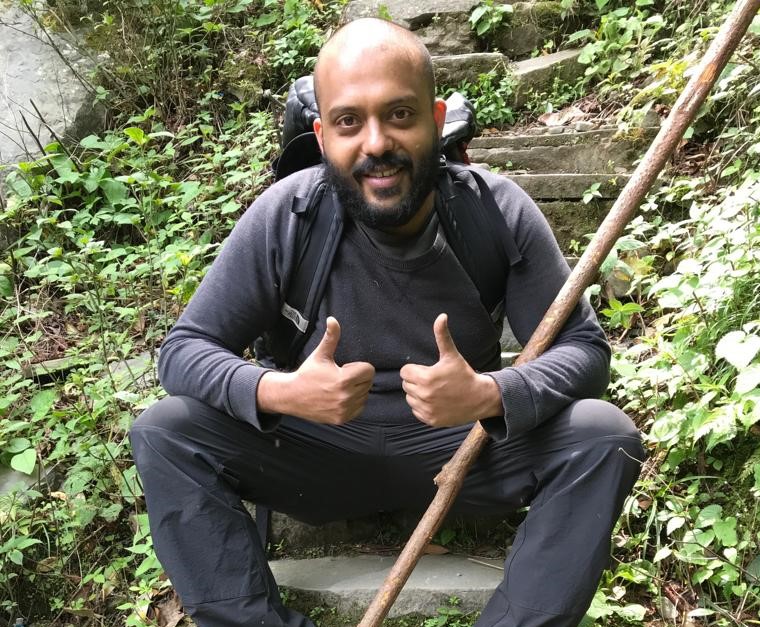Our world-leading environment and sustainability research underpins a wide range of postgraduate programmes. In our Meet our Alumni series we hear from graduates of our MSc courses within the Graduate School of Environment and Sustainability and learn about their experiences at the University of Exeter, Cornwall. Today we hear from Wribhu Ghosh who graduated from our MSc Renewable Energy Engineering course. Wribhu went on to become a Renewable Energy Design Engineer with ZLC Energy Limited.
Country: India
Sector: Utilities and Renewable Energy
Job title: Renewable Energy Design Engineer
Subject of study: MSc Renewable Energy Engineering
Year of graduation: 2020
Current Employer/Organisation Name
ZLC Energy Limited
What have you been doing since leaving Exeter, and what are you doing now?
•Design and deliver renewable energy solutions including – Solar PV, Solar Thermal, Heat Pumps as well as develop skills in Wind, Hydro, and CHP
•Development of initial as well as detailed designs, performance calculations, installation specifications, system drawings, and schematics
•Project support by developing detailed project planning, procurement of necessary materials and equipment, method statements, and risk analysis. Tracking of job, including cost and schedule analysis as well as securing third party approvals like planning, and grid connection
•Monitoring and evaluation of individual and alternative sustainable technologies specifically all aspects of microgeneration, energy efficiency, off-grid autonomy, water harvesting, and recycling
•Development of integration solution including control system engineering as well as evaluation and monitoring of product suppliers.
Why did you choose this career? And what do you enjoy most about your work?
I am a mechanical engineer and had a career in the auto industry in India. I was a regional service manager overseeing the business and operation in 7 states, with a team in the excess of 400 reporting to me directly or indirectly. Then I started growing a conscience. I feel the term ‘saving the planet’ is massively arrogant and the fight is actually for saving humanity and is the biggest threat humanity has ever faced and everyone is obliged to contribute to this fight in whatever capacity possible. Academia and seeking knowledge and qualification was the first step for me. The course was initially intimidating after coming back to education post a 12-year hiatus, but the uni and the curriculum, the faculty, and the staff were extremely friendly, supportive, and encouraging that I have never felt this inspired in my life. The course is very expensive for someone coming from a weaker economy, but it was absolutely worth it.
What did you enjoy most about your programme and what was the biggest highlight?
The thoughtful design of the curriculum, how it was kept open and left to the students to pursue their interest, and how the institution and the faculty provided every kind of support to go into as much detail with it. Uncle Kev as we would call Dr. Kev Hughes always said, ‘knowledge is cheap and easily available and it’s the skills that are worth its weight in gold ‘. I think that’s the biggest takeaway, and also the biggest difference from the previous education system I am coming from where I struggled to keep my motivation at times.
What did you enjoy most about studying here?
The freedom to learn what I wanted to, and the constant encouragement from the faculty to keep going.
Why did you choose to study at Exeter?
Because the University of Exeter offered me a £5000 scholarship which made the course a little cheaper compared to the other universities that offered me a position.
What skills and experiences have been most useful for your career?
In the second term, I took one module called sustainable architecture, The main reason for taking it was the module leader Adam and I just wanted to work with him. His enthusiasm energy and honesty were infectious. I didn’t have any other expectations from that module initially and focussed my attention on the other more engineering focussed modules. But in my current job designing solutions to make domestic properties energy efficient and cutting their carbon footprint, the knowledge I acquired in that module has proven invaluable.
What advice would you give to a current student who wishes to pursue your career?
Keep an open mind, and never get intimidated by anything. There are wonderful people around to help with it, but you must make the first step towards it. Never feel shy to reach out.
What are your plans for the future?
I have a job offer from the Celtic Sea Power as an Analyst, and offshore wind has always captured my imagination. I will be starting my new role in a couple of months after sorting the Visa. I do have aspirations of teaching young minds and in a few years will probably come back to academia. I also want to do something meaningful for my home country India, whose taxpayer money subsidized my first degree and helped me be where I am today.
The Graduate School of Environment and Sustainability brings together experts from across the spectrum of earth and life sciences, engineering, humanities, social sciences and business. Our programmes are all designed with a focus on developing solutions to global challenges and creating a better future for our planet and its people. Help lead a global Greener, Healthier and Fairer revolution by studying one of our world-leading, interdisciplinary Masters degrees here at the University of Exeter, Cornwall. See our Masters programmes here.

